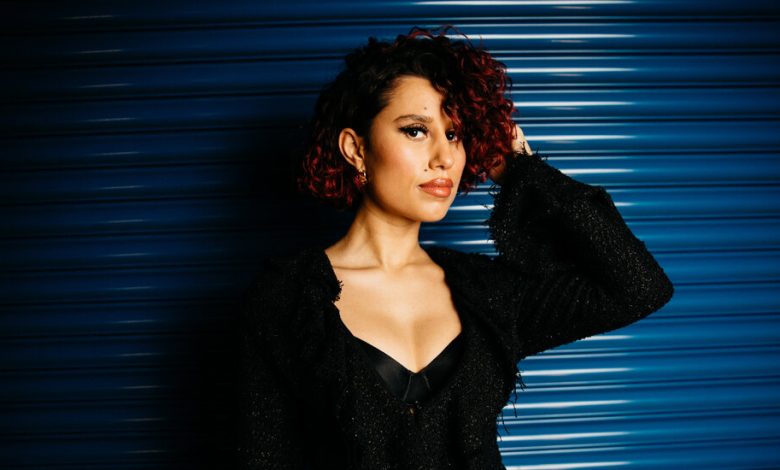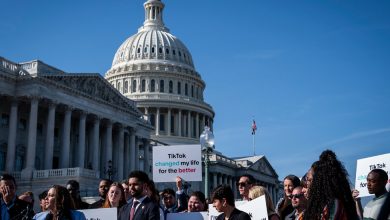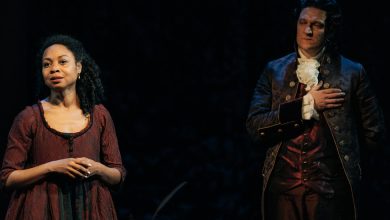Raye, Tired of Music’s Waiting Game, Releases an Album at Last

When the British artist Raye performed “Ice Cream Man.” during a January concert at the cavernous Utilita Arena in Birmingham, England, many of the young women in the audience began to cry.
“Everything you did, it left me in a ruin/And no I didn’t say a word/I guess that proves it/I’m a woman,” she sang, her voice assertive, but with a quiver of vulnerability. The intimate, spare track recounts her experience of sexual assault, and was one of several unflinchingly personal songs in her set as the opening act on Lewis Capaldi’s tour.
As she belted out “Escapism.,” a collaboration with 070 Shake that earned Raye her first U.K. No. 1 last month, the crowd screamed the lyrics back to her. Even that track, which exploded on TikTok and recounts a nihilistic night out with glib humor, is “actually quite a sad song,” Raye said, sitting in the bedroom she’d created on her tour bus after the show, a burning Le Labo candle nearby. But she chose to put the melody over “this fat beat with this fat bass,” adding sirens, synths and strings, which “makes me feel powerful in my pain,” she said.
Transforming her pain into power is a recurring theme on Raye’s debut album, “My 21st Century Blues,” which arrives on Friday, nine years after the 25-year-old musician signed her first record deal.
“When you think, ‘I want to be an artist,’ there are a few things you think of, the first thing being: album,” she said. But waiting became as much a part of her journey as creating.
Raye joined the roster of Polydor Records in 2014, and in the subsequent years wrote on tracks for artists including Beyoncé, John Legend and Charli XCX. While she worked on her own music, she said that the label encouraged her to make chart-friendly dance tracks with D.J.s like Joel Corry and David Guetta, which she now believes pigeonholed her as “the girl who sings on dance songs” that she didn’t even like. She wanted to create a body of work, but, “From a business perspective, they decided for me that I was this, and this was all I would ever be,” she said.
Sitting in her tour bus in stage makeup and sweatpants, Raye recalled the moment in June 2021 when, as she was about to record a performance for N.Y.C. Pride, a member of her team told she wasn’t going to be able to release an album with Polydor after all. “I freakin’ lost it,” she said.After bursting into tears, she wiped her eyes, recorded the broadcast and later posted a string of tweets about her frustration with the industry that drew loud support from other artists. Three weeks later, she announced that she had parted ways with the label.
A Polydor spokesman declined to comment on Raye’s description of her time with the company, and said, “We’ve loved seeing Raye having all of this well-deserved success and wish her the very best.”
Raye was determined to carry on. Last year, she signed a deal with the distribution service Human Re Sources. Its founder and chief executive, J. Erving, who is also an executive vice president at Sony, said in a video interview that Raye could have gotten more money upfront — “the bag, so to speak” — if she had signed with a traditional label. But instead she “bet on herself,” choosing to release her album as an independent artist who owns her masters.
For Raye, creative control was the key to continuing in an industry that had nearly broken her down. “I’m not interested in being a ‘singles’ girl, it’s the last thing I ever wanted to be,” she said. For her, the album format is not about “selling records” but telling stories.
Raye (born Rachel Keen) has known what kind of artist she wanted to be from a young age. At 10, she was determined to attend the BRIT School, the performing arts institution known for famous alumni, including Amy Winehouse and Adele. Four years later, she won a place at the school, which is near the home in south London she shared with her parents and three younger sisters.
Raye said she was so devoted to her budding career, she gave up her social life to write music after school and on weekends with professionals she met through her guitar teacher: “I’d get the train up to whatever address in my calendar and I would go into a room full of middle-aged men and be like ‘Hey, I’m going to write a song.’”
Growing up, her Ghanaian-Swiss mother and English father “worked stupidly, exceptionally hard,” she said, as a nurse and in insurance. Church, where her father played piano and her mother sang in the choir, was a big part of family life.
But Raye’s private time with the records she loved inspired her to dream big. Every day after school, she would lie on the living room floor and play “The Diary of Alicia Keys,” the singer’s 2003 album, “like a religion,” she said. With its hip-hop overture, spoken-word interludes and vivid storytelling, Raye said“Diary” made her excited to one day write her own liner notes, order her own track listing and tell people who she was through her music.
Raye’s vision for her debut album began with its title. “I wanted to tell my blues,” she said, which she defined as both a “12-bar phrase” but also “the stories on top.” Heartbreak, so often a focus in pop music, was just one small part of the human experience, she added, and the album also explores disordered eating and addiction.
“As a woman, it’s so taboo, and so unattractive, and so like, ‘God, she’s such a mess’ to even discuss having a problem,” Raye said. She described “Body Dysmorphia.” as the album’s most revealing track. “I’m so hungry I can’t sleep/But I know if I eat/Then I’ll be in the bathroom on my knees” she sings, her voice staccato over a trip-hop beat.
Making music out of hard truths has become as central to her mission as speaking them when she felt the industry was holding her back. And rather than using metaphors to keep such experiences hidden, Raye said it now feels “important to be honest about those things I kept in the darkness for so many years.”
It may be therapy for her listeners, but it helps her, too: “I want to create stuff that will make me feel better.”



